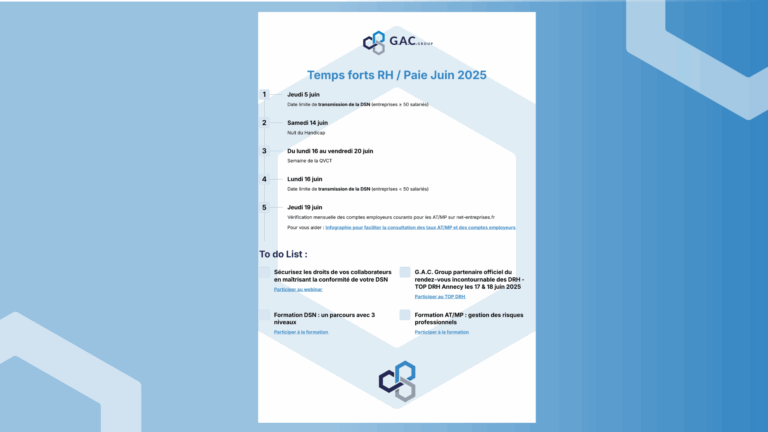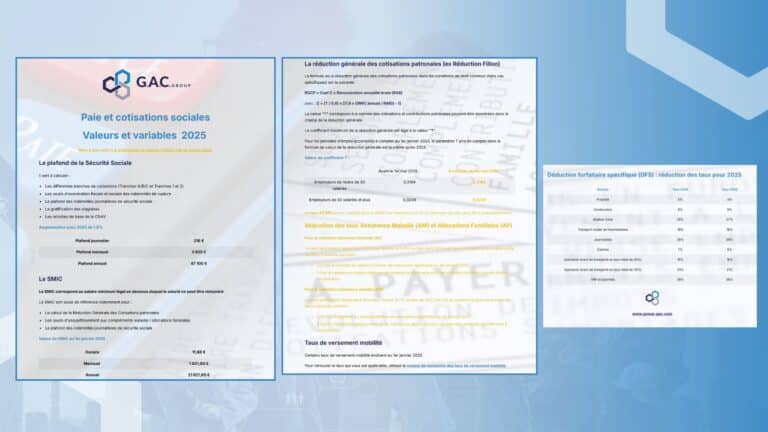Law no. 2024-364 of April 22, 2024The French law on various provisions for adapting to European Union law in the fields of economics, finance, ecological transition, criminal law, labor law and agriculture was published in the JO on April 23, 2024, and includes provisions on the acquisition of leave during periods of sick leave.
These provisions follow the decisions of the French Supreme Court (Cour de Cassation) on September 13, 2023, ruling that certain provisions of French labor law did not comply with European law on the acquisition of paid leave in the event of absence due to illness of non-occupational origin.
Let's take a look at the new rules applicable, modifying the provisions of article L3141-5 of the French Labor Code.
Acquiring paid leave and absence due to occupational illness or accident
The first change concerns stops for occupational illness or accident.
Until now, sick leave following an occupational illness or accident generated leave entitlements of up to one year.
This limit has now been lifted.
Thus, in the event of sick leave due to an occupational illness or accident, the entire period will be eligible for vacation entitlement, rather than the one-year period initially envisaged.
Acquiring paid leave and non-work-related sick leave
The last version of article L3141-5 of the French Labor Code stipulated that periods of actual work were considered as periods of leave for the purpose of determining the duration of leave:
"1° Periods of paid leave ;
2° Periods of maternity, paternity and adoption leave ;
3° Compulsory compensatory rest periods as provided for in articles L. 3121-30, L. 3121-33 and L. 3121-38;
4° Rest days granted under the collective agreement concluded in application of article L. 3121-44 ;
5° Periods, up to an uninterrupted period of one year, during which performance of the employment contract is suspended due to an accident at work or occupational disease;
6° Periods during which an employee is retained in or recalled to national service in any capacity whatsoever."
As emphasized in the September 13, 2023 rulings of the French Supreme Court (Cour de cassation), work stoppages resulting from non-occupational accidents or illnesses were not included in the calculation of leave entitlements.
To bring French law into line with European law, a new paragraph has been added to article L3141-5 of the French Labor Code, adding to the list of periods considered as actual work for the purposes of determining the duration of leave:
"7° Periods during which performance of the employment contract is suspended due to time off work as a result of a non-work-related accident or illness;
As a result, employees on non-work-related sick leave will henceforth be entitled to earn paid leave.
The bill also specifies the number of days of leave to which employees are entitled in respect of a period of non-work-related sick leave: "the duration of the leave to which the employee is entitled in respect of the periods mentioned in 7° of Article L. 3141-5 is two working days per month, up to a maximum allocation of twenty-four working days per reference period mentioned in Article L. 3141-10".
Accrual of paid leave and non-work-related sick leave and carryover
A deferral system is provided for employees who are unable to take all or part of the leave earned during the leave-taking period.
This deferral system varies according to the length of time off work at the end of the acquisition period or reference period.
Thus, the new article L341.19-1 provides for a deferral period of 15 months as of the "the date on which the employee receives the information specified in article L. 3141-19-3 after returning to work".
However, if the employee has been off work for at least a year on the date on which the reference period for which leave has been earned ends, the starting point of the 15-month period is the end of that earning period. The period is suspended until the employee is informed of his or her vacation entitlement, if the deferral period has not expired when the employee returns to work.
Each case will therefore have to be examined on its own merits, depending on the duration of the stoppage at the end of the vesting period, the dates of the stoppages and the vesting and leave-taking periods!
Lastly, it is stipulated that a company or establishment agreement or, failing that, an industry-wide agreement may set a longer deferral period than that provided for by law.
Acquiring paid leave and non-work-related sick leave and informing the employee
The bill, in its new article L. 3141-19-3, stipulates that the employer must inform the employee of his rights in the month following the resumption of work, by any means conferring a certain date, and specifies that the pay slip is one of these means.
The text then specifies the information to be sent to the employee:
- The number of days of leave available ;
- The date up to which these days of leave may be taken.
Acquisition of paid leave and sick leave: retroactivity of the law
The new provisions will apply for the period from December 1, 2009 to the date of entry into force of the law, for all provisions with the exception of those relating to the one-year limit for stoppages due to occupational illness or accident.
In addition, the additional leave acquired under these new provisions is limited: when the leave already acquired and the additional leave are added together, the leave entitlement obtained cannot exceed 24 days per reference period.
Accrual of paid leave and sick leave: time limit for claiming paid leave
Finally, for current employees, the time limit for bringing an action is two years from the law's entry into force.
What about declaring these sums via DSN?
A new instruction sheet, created on 10/09 (n° 2691), amended on 24/10, specifies the DSN reporting procedures for compensatory paid leave paid for days of leave earned during periods of sick leave.
It specifies that the retroactive payment of such an indemnity must be declared in the DSN and attached to the last period of the contract by transmitting the following blocks in particular:
- " Individual payment - S21.G00.50 ",
- " Remuneration - S21.G00.51 ",
- " Bonus, gratuity and allowance - S21.G00.52 ",
- " Income element calculated net - S21.G00.58 ",
- " Taxable base component - S21.G00.79 "
- " Individual contribution - S21.G00.81 "
For employees who left the company in the last 13 months, a report End of single employment contract "(FCTU) of the "Cancellation and Replacement" type must also be transmitted in order to integrate the ICCP into the remuneration elements useful for calculating unemployment insurance entitlements.
The sheet illustrates these instructions with :
- an example of how to declare the payment of ICCP for paid leave earned during periods of sick leave
- an example of regularization in the event of an error in the amount of ICCP declared
Receive all our expert news by e-mail.
Subscribe to our newsletter.








